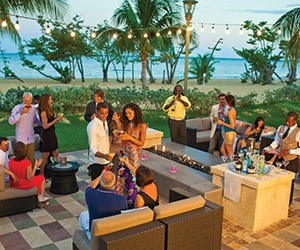While resort incentive programs have made a comeback since the dark days of recession and political scrutiny, they are far from the over-the-top celebratory gatherings of old.
Incentive experts say programs are increasingly business-focused while also emphasizing learning-based activities that have a lasting, life-enhancing impact for participants.
The shift reflects the sobering impact that the economic downturn has had not only on corporations, but on society as a whole, according to consumer trends analyst Daniel Levine, director of the Avant Guide Institute in New York.
“The economic downturn has forced people to look inward and think about what is really important,” he says. “They want more meaningful experiences–ones that can’t be taken away according to your bank balance.”
Incentives Investment
For the incentive industry, this means that companies are retooling motivational programs to fit the more serious mood of the times. While return on investment is a bigger priority than ever before, the good news for the industry is that many companies, including those that slashed or even eliminated incentive programs during the recession, now view them as essential to the bottom line.
“Companies really do understand the need to incentivize and engage their employees,” says Rhonda Brewer, vice president-group business manager, sales, for Maritz Travel and a SITE board member. “We went through such a difficult time and people saw what they were missing by not doing this. Incentives really do motivate employees—and keep them at the company.”PageBreak
Although most organizations are no longer avoiding resorts, perception issues have not entirely gone away, she adds.
“Some organizations still have an issue with five-star properties, so it may not be a go for everyone,” Brewer says. “Planners really have to look at the particular objectives and rules of each organization.”
While also acknowledging that some companies are still concerned with perception issues, Pamela Gilbert, director of sales and marketing for the Fairmont Scottsdale Princess in Scottsdale, Ariz., says many organizations also see the resort environment as the one most conducive for realizing objectives.
“The taint has come off a little because what resorts are offering has evolved,” she says. “Companies are booking us because we offer wellness programming, access to experiential speakers, good technology. You can have a productive meeting with a lot of content in a resort location, plus a relaxing and inspiring environment.”
Business Focus
With both time and budgets still a challenge for organizations, incentive programs are now more frequently combined with a business meeting, according to Gilbert, who says the “pure” incentive is now a rarity.
“The majority now have a training component, a new product launch or sessions on the company’s strategic vision,” she says. “A lot of content is being packed into the program. Companies are saying, ‘We realize the value of rewarding employees with a trip, but we also want to maximize ROI during the time they are there.’”
Gilbert notes that the need to incorporate meetings content into incentive programs has made it imperative for planners to be adept in both areas.
“Incentive houses have really evolved—most are not just doing pure incentives but are also doing hard-core corporate meetings and product launches,” she says. “There’s a well-educated group of planners who are focused more on events that provide great ROI back to companies.” PageBreak
Individual Needs
When they are not in sessions, attendees are looking for activities that offer “exclusive, once-in-a-lifetime experiences” not easily obtained elsewhere, according to Chris Gabaldon, chief sales and marketing officer for The Ritz-Carlton Hotel Co.
“The over-arching goal that planners are focused on is delivering an experience only available when an employee achieves the incentive trip,” he says.
The popularity of cooking competitions as well as wine blending and mixology workshops reflect the desire of attendees to learn something while having fun, according to Brewer.
“The experiential aspect is huge—especially delivering experiences that people can’t replicate on their own,” she says. “It’s about keeping people engaged.”
Attendees also want resort experiences tailored to their individual preferences, Gilbert says, noting that offering a range of recreational or fitness choices works better than planning one big golf tournament for everyone.
“Golf and tennis are still there, but now many planners want wider choices, especially in activities that help people de-stress and learn something different,” she says. “We’re seeing a lot of interest in yoga—everything from aerial yoga to yoga for beginners—as well as things like tai chi, acupuncture and cross-fitness training.”
Also important for many attendees is free time, Brewer says.
“People want more free time and not as much structure in an incentive,” she says. “It allows them to do something that is increasingly difficult to do—disconnect.”
However, she also notes that scheduling free time is increasingly challenging, as some companies have shortened programs and are packing in more content.
CSR Options
Not a passing fad, the trend for team-building activities with a give-back, corporate social responsibility focus still resonates with today’s incentive qualifiers, according to Gabaldon. Ritz-Carlton’s Community Footprints program includes a new group component called VolunTeaming available at resorts in the U.S., the Caribbean and Mexico.
“Not all of our clients are looking for this agenda feature or expect their attendees to participate in volunteering,” Gabaldon says. “However, when there is a vested interest by our clients to gather for a meaningful cause, there are highly increased levels of engagement when it is positioned as a team-building event.”
Offered in full-day or half-day segments, VolunTeaming projects include harvesting organic crops for donation to a local food bank, painting murals at a local Boys & Girls Club, helping preserve an historic park or landmark, or working with Habitat for Humanity.
Maria Lenhart is a former Meetings Focus editor.







